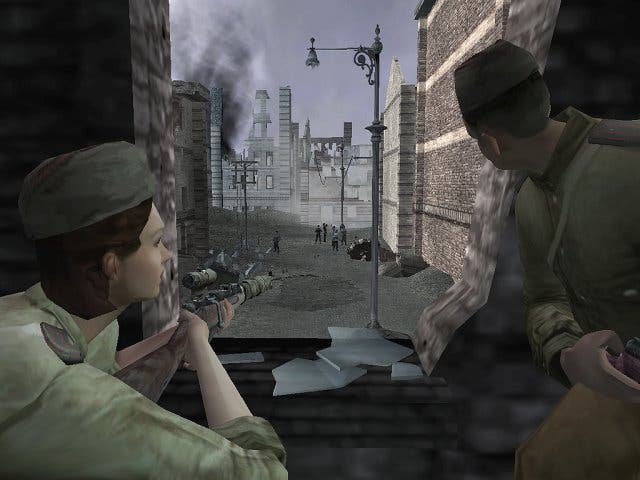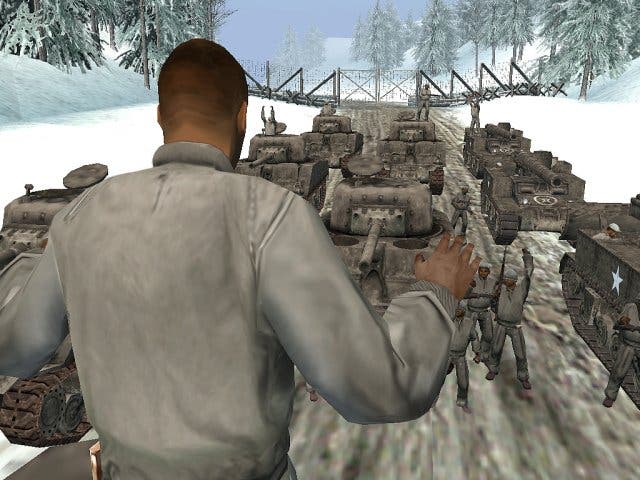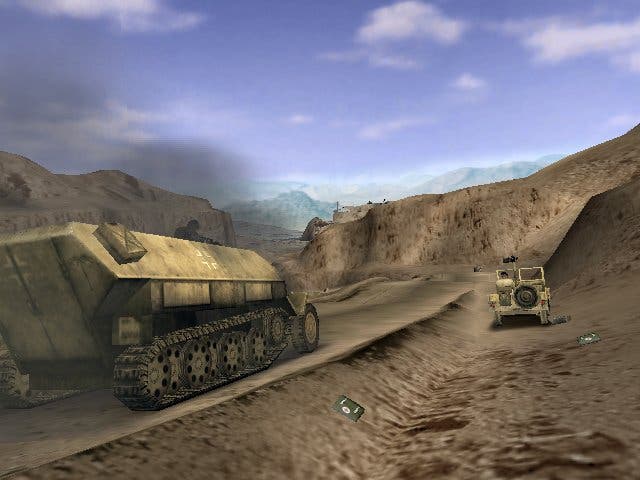Call of Duty: Finest Hour
I am a games reviewer get me out of World War II.
"I just can't do it any more. I just can't shoot any more Nazis."
No, it's not a line of dialogue from this latest iteration in the seemingly endless Fascist Shooting Gallery Extravaganza genre. In fact, it's a line uttered in Eurogamer Towers only yesterday, and, in a way, we know how the speaker feels. We really can't shoot any more Nazis. Not least because, frankly, we've already shot all of them. Medal of this, Call of that, Men of the other; we reckon we've killed more German soldiers than actually died in the entirety of World War II. We've even waited for them to come back from the dead and killed them again. It's not even funny any more.
War torn

I know, I know. We shouldn't start a review of a game by criticising the genre, but in ways it's important to make the point - we really are getting a bit bored of formulaic World War II shooters. Medal of Honour: Allied Assault essentially created the cinematic WW2 FPS, with a less than subtle nod and a wink to Spielberg, and since then everyone and his dog (most of whom are in some way related to the original team which made Allied Assault) has been releasing their own takes on the idea, ranging from genuine improvements through to stunningly bad mishaps, and occasionally taking a side-excursion into Vietnam for a chance to show off just how rubbish most foliage in videogames still looks.
However, even though we've now killed approximately the entire population of Germany twenty six times over and single-handedly won the war on no fewer than eight separate occasions, it's worth noting that Call of Duty still piqued our interest when it dropped in the door, for it comes with a set of impeccable credentials. After all, the original PC Call of Duty title, in our estimation, remains the high water mark for cinematic WW2 titles. Complex and demanding it was not, but it brimmed with magnificently conceived and often genuinely heart-rending gameplay sequences, offering up a short but perfectly formed catalogue of iconic moments which gelled together into a genuinely excellent game.
So, if we have to take our hopelessly archaic single-shot rifle out of retirement one last time and shoot some more Nazis, a game with the Call of Duty logo on the box seems like just the kind of catalyst to get us back on the battlefield.
So far, so World War II

For those unfamiliar with the PC version of the game, Call of Duty splits its campaign into three distinct parts which see you playing alternately as a Russian, British and an American soldier, with the campaigns kicking off in Stalingrad, North Africa and Aachen (West Germany) respectively, and essentially covering the historical period from the turning point of the war to its conclusion. You won't necessarily play as the same character through each of the campaigns, either - the game is happy to bounce you between characters in order to give a taste of several different styles of play, and as such breaks up its standard infantry-style gameplay with "specialist" missions ranging from sniping to commanding a tank or mowing down enemies from the back of a jeep.
A number of elements are carried over from the PC version; the graphics certainly have a similar look and feel, although the texture detail is poorer and there's the occasional nasty bit of slowdown, even on the Xbox version which we played. The PS2 version is a very decent game in graphical terms, but the Xbox once again feels like it's been lumbered with a direct port from its less powerful rival and despite the slowdown, Call of Duty certainly isn't taxing Microsoft's console in any meaningful way, which is a shame. The orchestral soundtrack is another thing that harks back to the PC version, and is largely excellent, its big dramatic sounds unquestionably overblown but perfectly appropriate to the action at hand.
Many of the weapons, which are of course modelled after the real-life arsenal in common use by troops in the war, are also from the PC version. You can carry two weapons at once, along with a stock of grenades, and weapons generally fall into either the powerful single-action rifle category, or the somewhat ineffectual spray 'n pray automatic weapon category, with a few specialist weapons such as Panzerfaust rocket launchers along the way. Most weapons can be zoomed to some extent by holding them up closer to your face, allowing you to look down the barrel and fire more accurately, and you also gain accuracy by crouching or lying prone.
Something fishy

So far, so familiar. However, Finest Hour's creators are adamant that this is actually an entirely new game for consoles, rather than a port of the PC version - and in fact, that's where the problems really start. The game does indeed eschew the level design seen on the PC in favour of constructing its own missions, taking only select elements of the gameplay seen in the original and building snatches of it into an entirely new set of objectives and map layouts. We're all for originality in games, but actually... This was a mistake.
We mentioned earlier that Call of Duty on the PC was full of iconic sequences stitched together to create a magnificent game, right? Well, Call of Duty: Finest Hour, frankly, isn't. Those who've played the PC version can see elements of those iconic sequences all right, but they're trapped under a layer of disappointingly generic mission design which has been plonked on top, ostensibly in the interests of providing an entirely new game, although we do wonder how much of that was actually down to avoiding the need to shoehorn some of Call of Duty's larger and more impressive levels onto the PlayStation 2.
Those sections which do remain are shadows of their former selves. Take for example the stunning section in the PC version where you sat on a boat full of fellow soldiers on the way across the Volga River into the hell of Stalingrad. In the original game, your boat was one of a flotilla making its way across, and as your sergeant roared out an impassioned nationalistic speech, other boats around you were sunk by shelling, deserters were shot for trying to swim back across the river, and the shoreline ahead loomed ever closer. You reached the end of the journey and got out of the boat, only to be refused a rifle - instead handed a clip of bullets, you're told to wait until someone else dies and then use their rifle.
Downsized

This self-same sequence opens Call of Duty: Finest Hour, but somewhere along the way, it's lost the powerful impact which it had when we first saw it. The dialogue is poorer, the trip across the river seems shorter and the flotilla of boats reduced to a handful, and when you reach the end, you get your handful of bullets with no apparent explanation as to why you didn't get a rifle, which misses the point somewhat. Once into Stalingrad, we were hugely disappointed; the fantastic sequence where your poorly armed comrades storm machinegun emplacements across the city's central square, somehow even more visceral and shocking than the D-Day landings of Allied Assault, is replaced by a procession of dreary trudges through derelict buildings with predictably placed German soldiers, and painfully generic running through trenches like a rat to take out a sequence of machine gun bunkers. This is progress?
It's a story repeated throughout the game, sadly. The scale of the experience is hugely diminished, and the great level design which made Call of Duty worth playing in the first place has been replaced by utterly generic FPS map making. It's absolutely not bad design, not by a long stretch - we've seen genuinely bad only this week, and this, friends, is not genuinely bad. It's just uninspired; solid, well-designed, but dull, inspiring none of the emotion or awe that the original Call of Duty's cinematic genius could induce in the player.
Of course, it's worth bearing in mind that many console gamers will never have seen the original game. To them, Call of Duty: Finest Hour is a very decent World War 2 action game. It's unlikely to actively disappoint anyone who picks it up, and the addition of a few fairly entertaining online modes will add a bit of longevity if that's your thing (and if you're not playing the Cube version), although we can't really see many people opting to play this on Live rather than Halo 2 in the foreseeable future. Graphically it's nothing to write home about, but it does the job, and the same can be said for the gameplay; only in the audio department does the game really rise above the level of being above average but nothing special.
Hour hopes dashed
All of which is, frankly, a bit of a disappointment. We had hoped that the talent which created Call of Duty might shine through in this console version, and re-ignite our once brightly burning passion for saving the free world from the Nazi menace. As it stands, it hasn't re-ignited much other than a vague feeling that we should pull the PC version out of the cupboard and play it again... And a thought process which wonders if there's really any market for well-made but uninspired FPS games in a season which has given us both Half-Life 2 and Halo 2.


